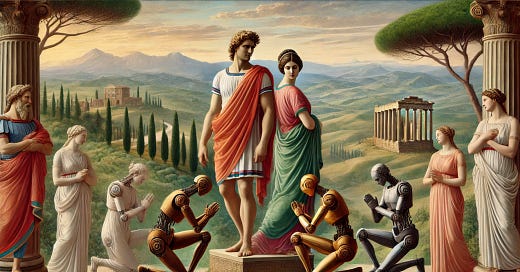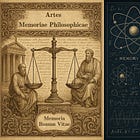I can’t tell you what the AI age will look like.
What has worth if robo nannies do everything for us? (A suspicion)
Utopia or hellscape?
Abundance for all or 99% poverty?
Many 20th-century predictions about today seem laughable, and we should be skeptical of the prognosticating horde of AI experts set on enlightening us. The Pareto-principle-like idea distributions skewing our thinking restrain theirs’ too.
But planning for the future amid this uncertainty is challenging. How many neurosurgeons will balk at committing 14-16 years to training when AIs might outperform them before they reach the finish line? Even the eight years (and piles of debt) required for lawyering may seem like a risky gamble.
But until someone begins a Butlerian Jihad, I feel confident that at least two human skillsets can’t be made obsolete. They’re underdeveloped in most of us today, so we don’t need to wait for an AI future to benefit from training them.
Today we’ll explore the first, and my next post will cover the second.
The Skill of Being Human
"All men by nature desire to know." — Aristotle, Metaphysics, 1.1
Until we can download information directly into our synapses and integrate it into “us” without destroying our uniqueness, we can’t rely on AI to align us with what matters. Maybe not even then.
In his Metaphysics, Aristotle famously suggests human nature drives us toward knowledge. He’s not talking about knowing facts; those with many facts but little mastery and context end up as pendants.
Aristotle argues that fully realized humans understand their place in the universe, build latticeworks of understanding, and define and execute goodness and beauty. These accomplishments can be savored in their own right, though they might also bring us practical benefits.
Knowing how to lean into them is a skill AI can’t disrupt.
A Return To Two Knowings
“The mind is not a vessel to be filled but a fire to be kindled.”
— Plutarch, On Listening to Lectures (paraphrase)
Building upon these and other Greek insights, the Romans conceived of skills, knowledge, and mastery as falling into two buckets:
The Artes Liberales: the arts of free people befitting fully sovereign individuals. Public speaking, math, grammar, logic, and music were the main elements. Science and philosophy were bolted on during the Middle Ages. Underlying all of these was memory, which was taught as a prerequisite skill.
The Artes Serviles: the servile arts of craftspeople, laborers, and slaves. They required physical exertion and were utilitarian. They were avoided by the well-to-do.
I once found this division ridiculous because I respect skilled craftspeople and many kinds of practical expertise. To snobbishly avoid what has great utility seems like a recipe for unbalanced living.
That’s still true, but my current view is more nuanced. I see how this “skill bifurcation” aligns with the virtue game and utility game dichotomy I’ve found so important in life.
Snobbishness aside, many predict AI will take the Artes Serviles from us in the coming decades and centuries. Robots or computers might execute them better than we can. So what skills can we take from the Artes Liberales, this “impractical” domain of skill, to maximize human flourishing?
The philosopher Seneca’s take is fascinating. He thinks that just as learning letters allows us to read and write, learning some elements of the Artes Liberales might allow us to be fully realized, wise, virtuous humans.
Seneca isn’t explicit about what these are, but I suspect two artes liberales enablers stand above the rest. I can speak for them because they’ve changed what I am.
Courting Mnemosyne:
In Greek myth, Mnemosyne (memory) was the mother of the creative muses. The ancients believed all arts and sciences — as well as wisdom and inspiration —stem from memory. Insight is elusive and understanding fleeting without the ability to recall at will.
Cicero’s De Oratore, the Rhetorica ad Herennium, and Quintilian’s Institutio Oratoria delve into the deep well of memory techniques the ancients found inseparable from utility and the good life. But memory arts came into their own during the Renaissance, where they were linked to spiritual growth, intellectual brilliance, and the Renaissance Man ideal in works such as Giordano Bruno's De Umbris Idearum and Robert Fludd's Utriusque Cosmi Historia.
The modern age’s neglect of memory is unprecedented and baffling. I was furious when I stumbled on Harry Lorayne’s The Memory Book in college. I jumped from constant academic struggle to being on the dean’s list in a semester. No one thought to tell me about this!? My memory was always poor, so my schools’ neglect of the memory arts had doomed me to flounder. Why? It boggles the mind.
Things have only gotten worse in recent years. Why memorize when you can google? Why remember, study, and master at all when any LLM can recall it for you?
But the cost of this intellectual equivalent to just-in-time logistics is stagnant human development in the areas that really matter. We are less than we were even a few generations ago. Yes, any fact is just a “Google” away. But it’s akin to owning a slave with a good memory. You can use them as a reference book for the fleetingly important (most things). But what your slave knows can’t be used to make your life rich, to make you well formed.
This is why Epictetus suggests students rehearse and memorize philosophical teaching they believe in like soldiers drilling for a life-and-death struggle (Discourses 3.24).
It’s why Seneca ended many of his letters to his friend and student Lucilius with a memorable, easily memorized epigram.
The memory arts are a vast field filling entire books. They can’t be covered here. The real question is, do you even know what you espouse? Really?
Consider lodging some of this in your brain:
Favorite bits of poetry
Snatches of Shakespeare
Moving speeches, fictional or political
The beliefs and ideas you ascribe to.
Anything else you find important in life.
Spaced repetition software like Anki? Creating a memory palace? There are countless options. Whatever you embed in your mind can be the building blocks of a better you.
I do a deep dive on the ars memoriae in this course:
Make Ideas Yours
“Let there be some distance between you and the book! How long will you be a pupil? Now, be a teacher as well.” — Seneca, Letters, 33
If memorization gives you a fine collection of stone and wood, you still need to turn them into something resonant and useful, a home to live in. You need to build with these materials if you’re to be improved by them.
Rewrite:
Marcus Aurelius made ancient ideas sing in his timeless notebook, Meditations.
He already had sections of famous plays and philosophic ideas memorized, either word for word or conceptually. He makes them land harder for himself by recrafting them for maximum impact while journaling.
He takes his planks, stones, and bricks and follows the advice of his old teacher, Fronto:
“…turn the same maxim twice or thrice, just as you have done with that little one. And so turn longer ones two or three times diligently, boldly. ..
…For the greater the thoughts, the more difficult it is to clothe them in words, and no small labour is needed to prevent those stately thoughts being ill-clothed or unbecomingly draped or half-naked.11”
In other words, rewrite them for maximum impact. Doing so will lodge them deeper in your memory and make them part of your natural thinking process. It makes them yours. More details here:
Build Yourself Through Teaching
This article is only half for you. It’s mostly for me, actually. I thought I knew something about the skill of human flourishing. Turns out I was a fool with a vague collection of ideas that didn’t stand up to scrutiny. When I tried to put them on paper, I couldn’t hide from my ignorance any longer.
This is where people get confused with AI. They think the output of writing is important and so outsource its production.
But writing is the process by which our ignorance is revealed to us. It’s the place where beliefs are refined, and where we maintain agency amid the self-destructive mob choking on a shrinking supply of ideas.
You can write an article like this one, but it might make more sense to try your hand at Nobel Prize-winning physicist Richard Feynman’s approach.
Pretend you’re teaching what you deem important to a sixth grader. Write out your lesson. Simplify (any fool can complexify).
Identify gaps in your argument. Where would the 6th grader lose the plot? Where are you missing supporting details? Go back to the source material to understand it better, or consider where you need to make original additions based on your life experience.
Organize and simplify.
Transmit/Teach (optional).
Whatever beliefs/philosophy/ideas you have that can’t be taught like this aren’t actually yours. They belong to an external guru, and you only half understand them. Yours is the knowledge of the dabbler and the pedant.
Seneca thought, “…all those people who are never authors but always interpreters, concealing themselves in the shadow of another, have nothing noble in them, for they have never dared to put into action what they have been so long in learning. They have trained their memories on other people’s words; but remembering is one thing, knowing is something else.”
My question for you is this: Will you be the author of your humanity in a way no AI can take from you? Or will live a half-life in others’ shadows, increasingly less as you rely more and more on an AI slave to know things for you?
The choice is yours, and I think the stakes are incredibly high. At the end of the day, it’s you that’s on the line.
Thanks for reading Socratic State of Mind.
If you liked this article, please like and share it, which helps more readers find my work.









Writing for mastery is an interesting topic that I’m sure you’ve been personally exploring for years/decades. Writing about writing for mastery seems like an excellent pursuit of benefit to interested readers like myself and your continued evolution as one of the best writers on this platform 👊🏻
Yes, to being the author of my own humanity.